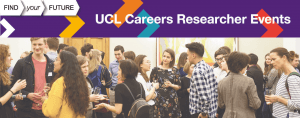Is a Masters Right for me? Assessing Your Options for Postgraduate Study
By skye.aitken, on 1 July 2020
Read time: 3 minutes
Written by Nicole Estwick, Careers Consultant at UCL Careers.
Dissertation complete. Exams over and Graduation is approaching. What’s next? For some, heading straight into full time employment may be the obvious choice but for a growing number of students, further study is becoming an increasingly popular option, particularly this year where according to careers platform Prospects* there has been a 40% increase in postgraduate course searches during Spring 2020- the period in which the Covid 19 outbreak reached its peak in the UK.
But how do you decide whether or not continuing onto postgraduate study is right for you, especially as someone who may be graduating this year? In this post we’ll cover some of the key points you may want consider in your decision making process.
- Should I do a Masters straight after my undergraduate degree?
Continuing on to complete a Masters straight after your undergraduate degree is a popular option for those who do not wish to disrupt the familiarity of studying at university or want to continue to develop a deeper understanding of their subject, however it is not the only option. Many individuals who study at postgraduate level are in fact mature students with 61% aged 25 or older coming back to study after a period of work experience. In some cases, employers may even sponsor students to complete a Masters part time alongside their professional role.
In the current climate where parts of the job market remain unclear for graduates, continuing onto complete a Masters this year may help you to build up your skills and expertise in a particular area to increase your chances of success for when the job market returns to normal so it’s worth considering if this could be an option for you. Alternatively you may want to assess if it would be better to take on postgraduate study after or alongside gaining work experience and once you have a clearer sense of your career goals.
- Is a Masters essential for my chosen career path?
A Postgraduate level qualification is an essential requirement to enter some professions, but not all, therefore it’s important to assess the value of a Masters qualification in relation to your career goals.
Take the time to research this by looking at job descriptions to see if a Masters is listed as essential (required) or desirable (not required) and gather insights from individuals working in the field you’re interested in through networking platforms such as LinkedIn or the UCL Alumni Online Community. Finally, seeking out whether the companies you are interested in are hiring at present and what value they place against work experience vs. academic qualifications is also very useful – this will vary from sector by sector but the insights gathered may help you to move forward in making a decision on whether to continue your studies.
- How will I fund further study?
Another big consideration to make in terms of pursuing further study is the financial investment required. Postgraduate study in the UK differs to your undergraduate degree in that course fees vary across subjects and can be higher in some cases than your original degree meaning that you may need to . Although there are financial bursaries and scholarships available, these vary between each university and can be competitive. Before making a decision, it is worth assessing if pursuing a postgraduate degree would be a good investment and if you have the tools in place to support yourself financially for an extended period of study along with general living costs. The website findamasters.com has some useful advice on this.
- Have I considered alternative options?
Finally, postgraduate study is not solely limited to Masters Programmes and some professions such as accountancy and HR require separate qualifications that must be completed as industry standard. These can be Postgraduate Certificate or Postgraduate Diploma courses. Another alternative are online courses available on platforms such as Futurelearn, Coursera and more which offer a chance to gain a in a broad range of academic and vocational subjects. Although these may not go into the same level of detail as a traditional Masters course and accreditation may vary, they offer a more flexible and often cheaper way to gain a qualification that you can make use of in your future career. It’s worth considering if this form of further study is recognised by employers in the area you’re interested in and if this could work for you as an alternative to a traditional Master’s qualification.
Thinking through your ideas for further study with the points above in mind may help you in your decision making process on whether or not to continue your studies as applications come to a close over the summer months.
For those requiring further support in assessing their options you can book into speak to a careers consultant in a 1:1 short guidance appointment or check out our ‘Should I do a Masters?’ CareersLab video.
 Close
Close



